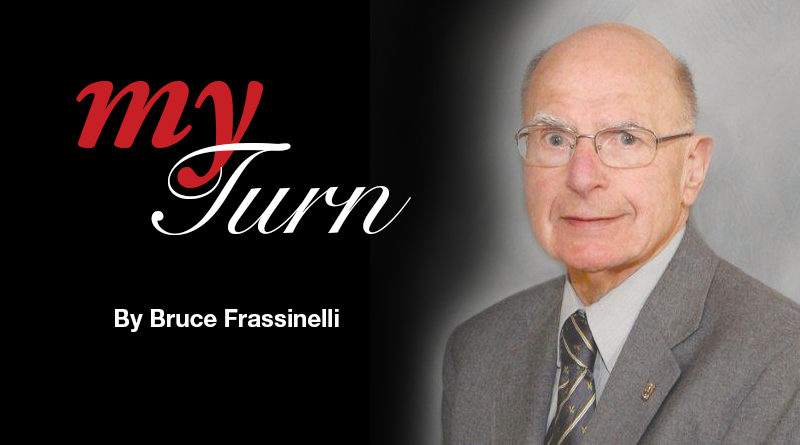Should Parents Cry in Front of Their Kids?
By Bruce Frassinelli
Email: bfrassinelli@ptd.net
My wife’s uncle was a crier. Uncle Larry would blubber at the slightest emotional provocation.
I, on the other hand, was branded as “stoic,” even as a “cold fish,” because I showed little to no emotion, at least not outwardly.
My father and my two brothers were equally tearless. I cannot recall even one occasion when any of them cried.
I wondered about my own track record. Although I can never recall crying in front of my three sons, perhaps I did. Surely, they would remember, because, if I had, it certainly would have been notable.
When I asked them recently—ages 56, 55, and 53—I received the expected answer: no, never.
In fact, my oldest son, Steve, put it even more emphatically: “I’ve never seen you even come close to crying,” he said.
It got me thinking about my children’s children. Had any of these five ever experienced their parents crying in front of them? Four of them said “no” immediately. The fifth asked for more time to think about it, then a few days later said she recalled once during a movie and during several big moments in her life, such as graduation.
My wife’s Uncle Larry said he comes from a long line of criers, which he believed is why his tears flowed so freely. On the other hand, my father and my much older brothers may have set the template for me, because, back in the day, there was a pervasive feeling that male tears were a sign of weakness, femininity, maybe even cowardice.
Being raised in a hard scrabble, heavily ethnic community in the coalfields of northeastern Pennsylvania, one needed an inner toughness and an impenetrable outer veneer to survive the daily taunts and physical challenges. This inner mettle needed to be complemented by an outward demeanor that announced that I was not going to take any guff.
Tears were viewed as the antithesis of that strength, so I recall on some occasions that even though I felt like crying I kept it bottled up. I suspect this defense mechanism followed me into adulthood and through my child-rearing years.
Although I may have felt this way years ago; I don’t today. It is not unusual for me to get choked up and teary-eyed when looking at a photo of my children as toddlers or reminiscences of family milestones or remembrances of my deceased mother, wife, sister-in-law and nephew. I can even shed a tear these days for a sappy movie or by observing a tender street scene unfold before my eyes.
So why did this change occur, I wondered. Was it a natural progression of things? Maturity? A change of perspective? The emergence of my softer side as I aged? Maybe it was all of these and more.
This philosophical reckoning with my inner self was prompted by a Washington Post article I read asking, “Should parents cry in front of their kids?”
There were times in my life when I was highly critical of myself for not being able to shed tears. There’s an expectation, I always thought, that tears of sadness were obligatory accompaniments to a period of mourning for loved ones.
The fact that I could not shed tears naturally left me wondering about my compassion or lack of it. I certainly felt the loss acutely and profoundly, but all of those strong emotions were internalized while outwardly it appeared as if I were unmoved by this grievous vacuum.
The British call it “a stiff upper lip,” but with my strong Italian-American background, I thought I would show more emotions. My mother pointed out once that this emotional outpouring is more natural with southern Italians compared to her and my father, who were born in northern Italy where emotions tended to be less demonstrative.
When my children were under our roof, the idea of crying in front of them never even came up. First of all, there were few occasions that could have brought me to tears, but we did lose family pets, and there were uncles, aunts, close cousins and close friends who died. These are potentially emotional moments that could have and probably should have produced tears, but none would come.
Would my kids be traumatized by seeing me cry? Of course they wouldn’t. One child psychologist noted that just as we should not hide our laughter from our children, we should be willing to let them see us exhibit other emotions, including crying.
In trying to recall my reaction to my sons as toddlers crying, I remember at times telling them to “stop crying,” “stop acting like a baby,” “stop crying like a girl,” “grow up,” “tough it out.”
Then, it occurred to me. This is what my parents and my brothers used to say to me on those few occasions when I would shed tears at home away from the judgmental eyes of my friends (and enemies).
Can I conclude then that it was passed on to me much as a defective gene would be, and I, in turn, passed it on to my three sons, and they, by some measures, have passed it on to their children? I have come to understand that there is no shame in not only feeling but expressing emotions, but there is a right way to do it, according to counselor Jessica Campbell. She believes we should tell our children what is happening – what has brought on these tears. It is important to let children know that their parents will keep them safe, Campbell said.
When children are older, they can understand more fully what is happening in their lives, so a parent’s tears may not be as frightening. In fact, it may even lead to the child’s appreciation of the parent’s compassion and empathy.

